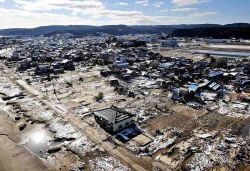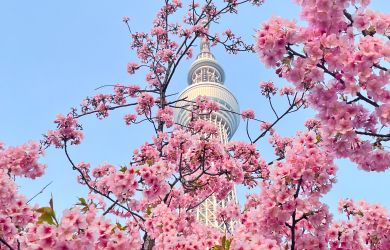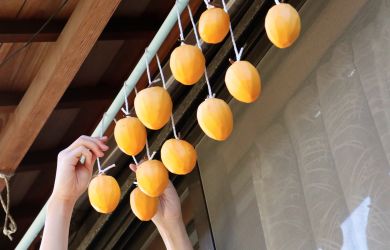
Originally published on metropolis.co.jp on August 2012
PUPPET MASTER

- The tiff between Osaka mayor Toru Hashimoto and the local bunraku community continues. After slashing the annual budget for the city’s puppet-play association by 25 percent, Hashimoto then attended a show and declared that the “staging was unsatisfactory” and “the last scene was plain, and lacked something.” To which one of the performers responded with a classic line: “Mr. Hashimoto says that if we create something interesting, people will come to watch, but I wonder if that’s the right approach to take.”
- The labor ministry is considering a proposal to raise the minimum wage from ¥737 to ¥744. Even if that happens, though, minimum-wage workers in Miyagi and Hokkaido will earn less than welfare recipients.
- The operator of Tokyo Disneyland says the park generated record sales (¥87.46 billion) and profits (¥3.04 billion) in the April-June quarter.
CRIMES & MISDEMEANORS
- A Tokyo man who disappeared for nine years after being found guilty in a 2002 hit-and-run accident resurfaced last month and offered an excuse: “I thought that even if I didn’t appear in court on the sentencing day it would be OK to go later.”
- In deciding not to bring charges against four cops over an incident at a local karaoke bar, police officials in Kanagawa have deemed, somewhat incredibly, that even though the men forced a female colleague to change her clothes in front of them and kiss them, their actions “do not constitute indecent assault or any other sex-related crime.”
- The only foreigner officially certified as a survivor of the atomic bombing of Hiroshima was found to be living in the US. Tomiko Shoji, an 86-year-old Taiwan native who acquired Japanese citizenship in 1985, currently resides in Ohio.
- In response to “a series of life-threatening accidents involving consumer products and services,” the government has decided to… set up a commission to investigate the issue.
SUCH IS LIFE
- For the first time in 26 years, Japanese women are not the longest-lived people in the world. Their average lifespan dropped by nearly half a year in 2011, to 85.9 years, and they are now second to women in Hong Kong, who live an average of 86.7 years.
- The health ministry says the two biggest factors for the decline in longevity are the high death toll from the March 11 disaster and an increase in suicides among young women.
- Japanese men fell from fourth to eighth on the global life expectancy list, with a longevity of 79.4 years, down 0.1 years. Guys in Hong Kong (80.5), Switzerland (80.2) and Iceland (79.9) have the highest longevity.
- The ministry also said that an astounding 85.9 percent of Japanese girls born in 2011 are expected to reach the age of 75, and 45.4 percent of them will live to be 90.
GOING GREEN
- A flowering coastal plant known as hama-nadeshiko that had been declared extinct in Iwate following the March 11 disaster was rediscovered by a couple whose home was washed away in the tsunami.
- Declaring that Japanese politics needs a “party that strongly pursues environmental policies,” a Japanese civic group has vowed to start a political bloc modeled on Europe’s green parties.
- Japanese environmentalists have come up with yet another reason to oppose the deployment of the US Marines’ Osprey aircraft to Okinawa: the intended flight path is over the habitats of a number of endangered species, including grouses and golden eagles.
- Demonstrators in the eastern Chinese city of Nantong disrupted the operations of a Japanese paper factory over its plans to install a new wastewater pipeline.
BRIGHT IDEAS
- In response to Tokyo’s increasingly strict no-smoking laws, a company called General Fundex has opened three air conditioned smoking rooms near Ochanomizu station. Users can pay ¥50 and can spend as much time as they like puffing away.
- Meanwhile, Japan Tobacco says the proportion of Japanese adults who smoke has hit an all-time low of 21.1 percent.
- The Delta Kappa Gamma Society announced that it would open its first Asian branch in Kochi. The 83-year-old nonprofit organization, which is dedicated to helping female educators, has 140,000 members in 17 countries.
- A research team from Ryukyu University has found that eating brown rice diminishes cravings for fatty foods. In mice, anyway.
OFFICIAL BUSINESS
- The government announced it will introduce a national ID system in which each citizen will be allotted their own individual personal identification number. The scheme’s Japlish moniker—“My Number”—is predictably lame.
- The foreign ministry says it will upgrade its African affairs office into a full-fledged bureau. The office had previously been part of the Middle Eastern and African Affairs Bureau.
- The government-run Japan Finance Corp. announced that the number of loans it’s given out to new businesses has skyrocketed 9.2 percent during the past year. Many of the loans have gone “to establish hair salons and restaurants.”
- The Council on National Strategy, meanwhile, says the keys to revitalizing the Japanese economy by 2020 will be “the fields of energy and environment, medical care and welfare, and agriculture, forestry, and fisheries.”
AND FINALLY…
- JR East has decided to revive a former train stop on the Chuo line that’s commonly referred to as “the phantom station.” Manseibashi station was shuttered after falling into disuse in 1943, but its platform and other facilities remain intact and will be refurbished.
- Tetsuya Chiba, the 73-year-old creator of Ashita no Joe and Ashita Tenki ni Naare, was named chairman of the Japan Cartoonists Association.
- A group of 22 secondhand bookstores in Tokyo and other areas have banded together to compile a catalog of 5,000 books that will be made available to victims of the March 11 disaster.
- Bottom Story of the Week: “Translator Hopes to Share Love of ‘Little House’ Series” (via The Daily Yomiuri)





